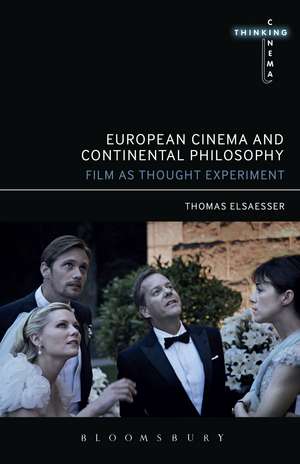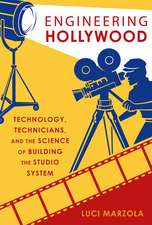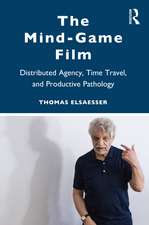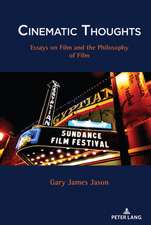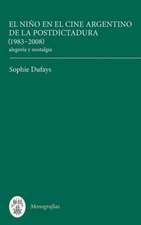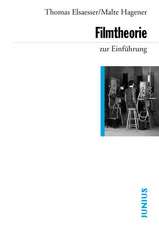European Cinema and Continental Philosophy: Film As Thought Experiment: Thinking Cinema
Autor Thomas Elsaesseren Limba Engleză Hardback – 28 noi 2018
| Toate formatele și edițiile | Preț | Express |
|---|---|---|
| Paperback (1) | 254.58 lei 22-36 zile | +65.14 lei 6-12 zile |
| Bloomsbury Publishing – 28 noi 2018 | 254.58 lei 22-36 zile | +65.14 lei 6-12 zile |
| Hardback (1) | 834.38 lei 43-57 zile | |
| Bloomsbury Publishing – 28 noi 2018 | 834.38 lei 43-57 zile |
Preț: 834.38 lei
Preț vechi: 970.21 lei
-14% Nou
Puncte Express: 1252
Preț estimativ în valută:
159.66€ • 167.12$ • 132.89£
159.66€ • 167.12$ • 132.89£
Carte tipărită la comandă
Livrare economică 31 martie-14 aprilie
Preluare comenzi: 021 569.72.76
Specificații
ISBN-13: 9781441129499
ISBN-10: 1441129499
Pagini: 352
Dimensiuni: 152 x 229 mm
Greutate: 0.64 kg
Editura: Bloomsbury Publishing
Colecția Bloomsbury Academic
Seria Thinking Cinema
Locul publicării:New York, United States
ISBN-10: 1441129499
Pagini: 352
Dimensiuni: 152 x 229 mm
Greutate: 0.64 kg
Editura: Bloomsbury Publishing
Colecția Bloomsbury Academic
Seria Thinking Cinema
Locul publicării:New York, United States
Caracteristici
New readings comparing acclaimed directors with pressing political/ethical issues debated in contemporary continental philosophy
Notă biografică
Thomas Elsaesser is Emeritus Professor at the University of Amsterdam, The Netherlands, and since 2013 Visiting Professor at Columbia University. European Cinema and Continental Philosophy further develops Elsaesser's approach to national and auteur cinema begun with Fassbinder's Germany: History Identity Subject (1996), continued with European Cinema - Face to Face with Hollywood (2005) and given a theoretical turn in Film Theory: An Introduction through the Senses (2010).
Cuprins
Table of ContentsChapter 1: European Cinema into the 21st Century: Enlarging the Context?Chapter 2: Film as Thought: The 'Film and Philosophy' Debate Chapter 3: Film as Thought ExperimentChapter 4: "Europe" - A Thought ExperimentChapter 5: A Cinema of Abjection?Chapter 6: Post-heroic Narratives and the Community-to-ComeChapter 7: Claire Denis, Jean-Luc Nancy and Beau TravailChapter 8: Hitting Bottom: Aki Kaurismäki and the Abject Subject: The Man Without A PastChapter 9: "Experimenting with Death in Life" Fatih Akin and the Ethical TurnChapter 10: Black Suns and a Bright Planet: Lars von Trier's Melancholia as Thought ExperimentChapter 11: Anatomy Lesson of A Vanished Country: Christian Petzold's BarbaraChapter 12: Control, Creative Constraints and Self Contradiction: The Global AuteurBibliographyFilmographyIndex
Recenzii
Accessible and rigorous, brimming with indispensable insights for students, scholars, and readers of film studies, continental philosophy, visual culture, and media theory ... It is a rare pleasure to read a work of film-philosophy that so carefully balances textual hermeneutics and political deconstructions.
Constitutes an interdisciplinary epistemological and philosophical map, a challenging and precious tool to register, draw and address the complex socio-political dynamics of our time with a critical and experimental spirit ... [An] essential text (a must read for these dangerous times).
Not only a rich exploration of the relationship between film and philosophy, European Cinema and Continental Philosophy makes a timely claim on the stakes of thinking Europe today. Elsaesser provides a new and urgently needed framework for grappling with the contemporary conditions of European politics and film culture.
Elsaesser argues for a contemporary European cinema of openness and multiplicity, for a cinema that foregrounds autonomy and liberation. These arguments are backed up by an impressive account of contemporary European philosophy and its influences on cinematic thought. Elsaesser develops the key notions of a 'cinema of abjection' and 'post-heroic narratives' and, as a result, he charts an impressive map of European cinema and a European politics to come.
European Cinema and Continental Philosophy offers an important and deeply engaging reappraisal of the status of European cinema at a moment of apparent crisis. There is both defiance and brilliance in the way that Elsaesser, situating cinema in its wider philosophical, political, social, and cultural contexts, seizes upon its perceived marginality and irrelevance as the key to its strength, and presents the widespread "abjection" he identifies, as evidence of creative freedom and the embodiment of Europe's core Enlightenment values. This volume combines daring originality with the impressive scholarship we have come to expect from Thomas Elsaesser. It is a work of major significance which will have a profound impact upon contemporary and future film studies.
Constitutes an interdisciplinary epistemological and philosophical map, a challenging and precious tool to register, draw and address the complex socio-political dynamics of our time with a critical and experimental spirit ... [An] essential text (a must read for these dangerous times).
Not only a rich exploration of the relationship between film and philosophy, European Cinema and Continental Philosophy makes a timely claim on the stakes of thinking Europe today. Elsaesser provides a new and urgently needed framework for grappling with the contemporary conditions of European politics and film culture.
Elsaesser argues for a contemporary European cinema of openness and multiplicity, for a cinema that foregrounds autonomy and liberation. These arguments are backed up by an impressive account of contemporary European philosophy and its influences on cinematic thought. Elsaesser develops the key notions of a 'cinema of abjection' and 'post-heroic narratives' and, as a result, he charts an impressive map of European cinema and a European politics to come.
European Cinema and Continental Philosophy offers an important and deeply engaging reappraisal of the status of European cinema at a moment of apparent crisis. There is both defiance and brilliance in the way that Elsaesser, situating cinema in its wider philosophical, political, social, and cultural contexts, seizes upon its perceived marginality and irrelevance as the key to its strength, and presents the widespread "abjection" he identifies, as evidence of creative freedom and the embodiment of Europe's core Enlightenment values. This volume combines daring originality with the impressive scholarship we have come to expect from Thomas Elsaesser. It is a work of major significance which will have a profound impact upon contemporary and future film studies.
